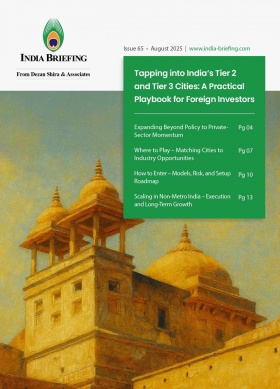GST Rate Revisions for Services: What Businesses Need to Know
India’s GST Council has introduced a new two-rate framework for services in 2025 – 5 percent without ITC or 18 percent with ITC. Cheaper insurance, wellness, and job work services bring consumer relief, while higher GST on petroleum, outsourcing, and transport will impact businesses.
For our coverage on the new GST rates on goods, see our article here: India’s GST Overhaul: What Goods Become Cheaper and What Gets Costlier
The GST Council has moved services to a clearer two-rate framework – either 5 percent without or with limited input tax credit (ITC) – or 18 percent with ITC. This distinction creates a new indirect tax approach: consumer-facing services, where ITC is less relevant, are shifted to 5 percent to make them affordable, while business-to-business (B2B) and capital-intensive sectors remain at 18 percent, preserving ITC benefits.
ALSO READ: India GST Overhaul 2025: Which Goods Get Cheaper & Costlier
GST relief for job work services
Lower GST on manufacturing-linked job work
Several manufacturing-linked job work services will now enjoy lower GST rates. Job work for umbrellas, printing, bricks, pharmaceuticals, and leather has been reduced from 12 percent to 5 percent, while retaining ITC. This directly lowers outsourcing costs for industries reliant on contract processing.
Higher GST on residual outsourcing services
However, residual job works not covered under specific categories have moved upward from 12 percent to 18 percent, making general outsourcing costlier.
GST rejig: Local delivery services and digital platforms
Local delivery services remain subject to 18 percent GST with input tax credit (ITC). However, the GST Council’s latest decision to include platform-based deliveries under Section 9(5) of the CGST Act shifts the tax liability directly onto online platforms.
Under the new rule, delivery services arranged through platforms such as Zomato, Swiggy, Swiggy Genie, Borzo (WeFast), and Uber Courier will now make the platforms—not small, individual delivery agents—responsible for GST compliance. This change is designed to reduce the compliance burden on gig workers while ensuring consistent taxation across digital intermediaries.
For food delivery companies like Zomato and Swiggy, the move could put pressure on margins, as delivery is their core business function. Both firms are reportedly assessing the financial impact and may consider raising delivery fees to balance costs. Subscription-based services like Swiggy One and Zomato Gold, however, are unlikely to be directly affected since they are categorized as value-added services.
Key GST rate reductions on essential services
A wide range of essential services have shifted from 12 percent to 5 percent, benefiting end consumers. These include goods carriage insurance, effluent treatment, biomedical waste disposal, and cinema tickets priced at INR 100 or less. Budget hotel accommodation now attracts 5 percent GST, though without ITC, limiting benefits for the hospitality industry. Beauty and wellness services, such as salons and gyms, have also moved to 5 percent without ITC, reducing costs for customers but tightening business margins.
GST hike on petroleum and specialized services
On the other hand, specialized petroleum-related services, including technical, professional, and support activities in exploration and drilling, have moved up from 12 percent to 18 percent, aligning with the standard GST rate while preserving ITC access.
GST rate changes for transport services
Transport of goods has been restructured with a dual-rate option: 5 percent without ITC or 18 percent with ITC. This applies to goods transport agencies (GTA), container transport by rail (other than Indian railways), petroleum transport by pipeline, and multimodal transport. The shift from 12 percent to 18 percent for ITC-eligible options raises costs for businesses relying on credit, while maintaining a low-cost option for those outside ITC chains.
Balancing consumer relief and business costs
The revisions aim to simplify service taxation while balancing affordability with revenue needs. Consumers benefit from cheaper insurance, wellness services, and budget entertainment, while sectors like petroleum exploration and generic job work face higher GST outgo.
For businesses, the availability or restriction of ITC remains the key determinant of actual cost impact under the new framework.
About Us
India Briefing is one of five regional publications under the Asia Briefing brand. It is supported by Dezan Shira & Associates, a pan-Asia, multi-disciplinary professional services firm that assists foreign investors throughout Asia, including through offices in Delhi, Mumbai, and Bengaluru in India. Dezan Shira & Associates also maintains offices or has alliance partners assisting foreign investors in China, Hong Kong SAR, Vietnam, Indonesia, Singapore, Malaysia, Mongolia, Dubai (UAE), Japan, South Korea, Nepal, The Philippines, Sri Lanka, Thailand, Italy, Germany, Bangladesh, Australia, United States, and United Kingdom and Ireland.
For a complimentary subscription to India Briefing’s content products, please click here. For support with establishing a business in India or for assistance in analyzing and entering markets, please contact the firm at india@dezshira.com or visit our website at www.dezshira.com.
- Previous Article India’s Passport Status in 2025: New Developments and Business Opportunities
- Next Article Private Limited vs LLP vs OPC in India: Complete Guide for Foreign Investors












